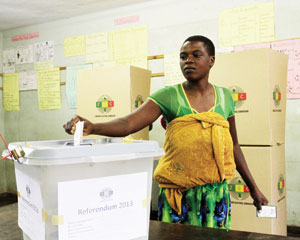
From the voters’ point of view, the new system will be fairly easy to understand.
veritas
Voters are used to the idea of harmonised elections and casting three separate votes in one polling-station does not seem to have caused any great difficulty in the past.
Whether all voters will understand that their vote for a constituency candidate will also be counted in three other elections is perhaps more doubtful.
At the very least, the parties’ lists of candidates will have to be displayed prominently at every polling station, with notices informing voters that a vote for a party’s constituency candidate will also be a vote for all the party’s party-list candidates.
In the National Assembly, the advantages of the first-past-the-post system will be combined with those of proportional representation. The 210 constituency members, elected on a first-past-the-post basis, will retain links to their local communities since they will depend on those local communities for their election, while the 60 women party-list members may allow smaller parties more equitable representation in the Assembly.
However, all the party-list members of the National Assembly will be women, so there will be at least 60 women members of the Assembly. At least half the 60 elected senators will be women since the parties’ lists will have to have equal numbers of men and women candidates and for the same reason half of the 10 elected members of each provincial council will be women.
When vacancies occur in parliament under our present constituency-based electoral system, the vacancies have to be filled by holding by-elections. Under the new Constitution, if a party-list member of parliament dies or vacates his or her seat the vacancy will be filled by appointing the next candidate on the party’s list.
- Chamisa under fire over US$120K donation
- Mavhunga puts DeMbare into Chibuku quarterfinals
- Pension funds bet on Cabora Bassa oilfields
- Councils defy govt fire tender directive
Keep Reading
All the elected members of the Senate and provincial councils will be elected on party lists, so there will be no place for independent candidates (i.e candidates who do not represent a political party) on those bodies.
The only forums where independent candidates will be able to gain a seat will be in the National Assembly and in local authority councils.
Paradoxically, by reserving 60 seats in the National Assembly for women, the new Constitution may marginalise women. Political parties may tend to put forward men as candidates for the constituency seats in the National Assembly because their women candidates will have a greater chance of election as party-list candidates.
A party-list system increases the power of political parties because, by definition, the party lists are prepared by the parties. While political parties are necessary for the smooth running of a parliamentary system, in Zimbabwe they have quite enough power as it is without being given more.
‘VOTERS HAVE LACK OF CHOICE’
Voters will lose their right to choose between different candidates for different elected bodies. For example, a voter who likes party A’s constituency candidate for the National Assembly but dislikes the party’s candidates for the Senate will have to vote for those candidates willy-nilly or else forgo voting for the constituency candidate.
Put differently, parties will present voters with “packages” of candidates who must be voted for en bloc — and very large packages they will be, too.











